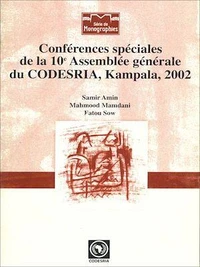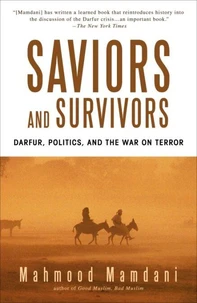Saviors and survivors. Darfur, politics, and the war on terror
Par :Formats :
Disponible dans votre compte client Decitre ou Furet du Nord dès validation de votre commande. Le format ePub est :
- Compatible avec une lecture sur My Vivlio (smartphone, tablette, ordinateur)
- Compatible avec une lecture sur liseuses Vivlio
- Pour les liseuses autres que Vivlio, vous devez utiliser le logiciel Adobe Digital Edition. Non compatible avec la lecture sur les liseuses Kindle, Remarkable et Sony
 , qui est-ce ?
, qui est-ce ?Notre partenaire de plateforme de lecture numérique où vous retrouverez l'ensemble de vos ebooks gratuitement
Pour en savoir plus sur nos ebooks, consultez notre aide en ligne ici
- Nombre de pages942
- FormatePub
- ISBN978-2-86978-982-1
- EAN9782869789821
- Date de parution12/10/2020
- Protection num.Digital Watermarking
- Taille1 Mo
- Infos supplémentairesepub
- ÉditeurCODESRIA
Résumé
In Saviors and Survivors, Mahmood Mamdani explains how the conflict in Darfur began as a civil war (1987-89) between nomadic and peasant tribes over fertile land in the south, triggered by a severe drought that had expanded the Sahara Desert by more than sixty miles in forty years; how British colonial officials had artificially tribalized Darfur, dividing its population into « native » and « settler » tribes and-creating homelands for the former at the expense of the latter; how the war intensified in the 1990s when the Sudanese government tried unsuccessfully to address the problem by creating homelands for tribes without any.
The involvement of opposition parties gave rise in 2003 to two rebel movements, leading to a brutal insurgency and a horrific counterinsurgency - but not to genocide, as the West has declared. Mamdani also explains how the Cold War exacerbated the twenty-year civil war in neighboring Chad, creating a confrontation between Libya's Muammar al-Qaddafi (with Soviet support) and the Reagan administration (allied with France and Israel) that spilled over into Darfur and militarized the fighting.
By 2003, the war involved national, regional and global forces, including the powerful Western lobby, who now saw it as part of the War on Terror and called for a military invasion dressed up as « humanitarian intervention. » « Mamdani traces the path to the Darfur tragedy through its historical and colonial roots to the current situation, where drought and desertification have led to conflict over land among local tribes, rebellion, and finally to the brutal involvement of the forces of the state and to the efforts of the United Nations and others to help the victims and stop the violence.
His radical réévaluation of the Darfur problem is a major contribution to understanding and, it is to be hoped, to ending a shocking human disaster. » - Sir Brian Urquhart Former Under-Secretary-General of the United Nations « There are three reasons why this book's perspective on the Sudan-Darfur conflict may be of considerable value to readers interested in African politics and international relations.
First, Saviors and Survivors is unique in that it presents an African-centered perspective on the Sudan-Darfur crisis in the context of the study of international relations, geopolitics and the War on Terror. Second, it draws attention to African regional, epistemological and ideological perspectives on the crisis. Third, it tackles the bogeyman of African politics-the national-ethnic question in the context of cultural pluralism...
Hidden in the middle of Saviors and Survivors' controversial thesis critiquing international interventionism is Mamdani s scholarly genius. The book scrutinizes, critically analyzes, deconstructs and reconstructs the deep historical transformations that constitute the underbelly of the continents post-colonial citizenship structures. »
The involvement of opposition parties gave rise in 2003 to two rebel movements, leading to a brutal insurgency and a horrific counterinsurgency - but not to genocide, as the West has declared. Mamdani also explains how the Cold War exacerbated the twenty-year civil war in neighboring Chad, creating a confrontation between Libya's Muammar al-Qaddafi (with Soviet support) and the Reagan administration (allied with France and Israel) that spilled over into Darfur and militarized the fighting.
By 2003, the war involved national, regional and global forces, including the powerful Western lobby, who now saw it as part of the War on Terror and called for a military invasion dressed up as « humanitarian intervention. » « Mamdani traces the path to the Darfur tragedy through its historical and colonial roots to the current situation, where drought and desertification have led to conflict over land among local tribes, rebellion, and finally to the brutal involvement of the forces of the state and to the efforts of the United Nations and others to help the victims and stop the violence.
His radical réévaluation of the Darfur problem is a major contribution to understanding and, it is to be hoped, to ending a shocking human disaster. » - Sir Brian Urquhart Former Under-Secretary-General of the United Nations « There are three reasons why this book's perspective on the Sudan-Darfur conflict may be of considerable value to readers interested in African politics and international relations.
First, Saviors and Survivors is unique in that it presents an African-centered perspective on the Sudan-Darfur crisis in the context of the study of international relations, geopolitics and the War on Terror. Second, it draws attention to African regional, epistemological and ideological perspectives on the crisis. Third, it tackles the bogeyman of African politics-the national-ethnic question in the context of cultural pluralism...
Hidden in the middle of Saviors and Survivors' controversial thesis critiquing international interventionism is Mamdani s scholarly genius. The book scrutinizes, critically analyzes, deconstructs and reconstructs the deep historical transformations that constitute the underbelly of the continents post-colonial citizenship structures. »
In Saviors and Survivors, Mahmood Mamdani explains how the conflict in Darfur began as a civil war (1987-89) between nomadic and peasant tribes over fertile land in the south, triggered by a severe drought that had expanded the Sahara Desert by more than sixty miles in forty years; how British colonial officials had artificially tribalized Darfur, dividing its population into « native » and « settler » tribes and-creating homelands for the former at the expense of the latter; how the war intensified in the 1990s when the Sudanese government tried unsuccessfully to address the problem by creating homelands for tribes without any.
The involvement of opposition parties gave rise in 2003 to two rebel movements, leading to a brutal insurgency and a horrific counterinsurgency - but not to genocide, as the West has declared. Mamdani also explains how the Cold War exacerbated the twenty-year civil war in neighboring Chad, creating a confrontation between Libya's Muammar al-Qaddafi (with Soviet support) and the Reagan administration (allied with France and Israel) that spilled over into Darfur and militarized the fighting.
By 2003, the war involved national, regional and global forces, including the powerful Western lobby, who now saw it as part of the War on Terror and called for a military invasion dressed up as « humanitarian intervention. » « Mamdani traces the path to the Darfur tragedy through its historical and colonial roots to the current situation, where drought and desertification have led to conflict over land among local tribes, rebellion, and finally to the brutal involvement of the forces of the state and to the efforts of the United Nations and others to help the victims and stop the violence.
His radical réévaluation of the Darfur problem is a major contribution to understanding and, it is to be hoped, to ending a shocking human disaster. » - Sir Brian Urquhart Former Under-Secretary-General of the United Nations « There are three reasons why this book's perspective on the Sudan-Darfur conflict may be of considerable value to readers interested in African politics and international relations.
First, Saviors and Survivors is unique in that it presents an African-centered perspective on the Sudan-Darfur crisis in the context of the study of international relations, geopolitics and the War on Terror. Second, it draws attention to African regional, epistemological and ideological perspectives on the crisis. Third, it tackles the bogeyman of African politics-the national-ethnic question in the context of cultural pluralism...
Hidden in the middle of Saviors and Survivors' controversial thesis critiquing international interventionism is Mamdani s scholarly genius. The book scrutinizes, critically analyzes, deconstructs and reconstructs the deep historical transformations that constitute the underbelly of the continents post-colonial citizenship structures. »
The involvement of opposition parties gave rise in 2003 to two rebel movements, leading to a brutal insurgency and a horrific counterinsurgency - but not to genocide, as the West has declared. Mamdani also explains how the Cold War exacerbated the twenty-year civil war in neighboring Chad, creating a confrontation between Libya's Muammar al-Qaddafi (with Soviet support) and the Reagan administration (allied with France and Israel) that spilled over into Darfur and militarized the fighting.
By 2003, the war involved national, regional and global forces, including the powerful Western lobby, who now saw it as part of the War on Terror and called for a military invasion dressed up as « humanitarian intervention. » « Mamdani traces the path to the Darfur tragedy through its historical and colonial roots to the current situation, where drought and desertification have led to conflict over land among local tribes, rebellion, and finally to the brutal involvement of the forces of the state and to the efforts of the United Nations and others to help the victims and stop the violence.
His radical réévaluation of the Darfur problem is a major contribution to understanding and, it is to be hoped, to ending a shocking human disaster. » - Sir Brian Urquhart Former Under-Secretary-General of the United Nations « There are three reasons why this book's perspective on the Sudan-Darfur conflict may be of considerable value to readers interested in African politics and international relations.
First, Saviors and Survivors is unique in that it presents an African-centered perspective on the Sudan-Darfur crisis in the context of the study of international relations, geopolitics and the War on Terror. Second, it draws attention to African regional, epistemological and ideological perspectives on the crisis. Third, it tackles the bogeyman of African politics-the national-ethnic question in the context of cultural pluralism...
Hidden in the middle of Saviors and Survivors' controversial thesis critiquing international interventionism is Mamdani s scholarly genius. The book scrutinizes, critically analyzes, deconstructs and reconstructs the deep historical transformations that constitute the underbelly of the continents post-colonial citizenship structures. »










